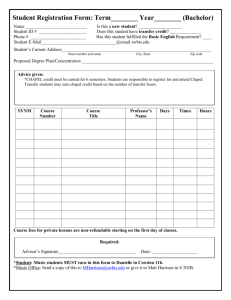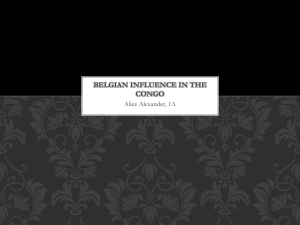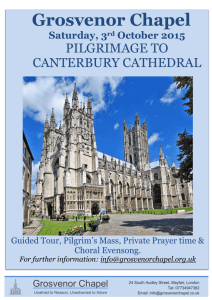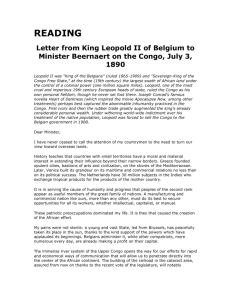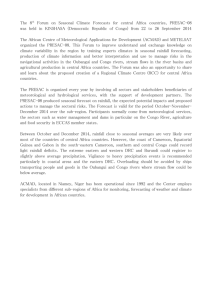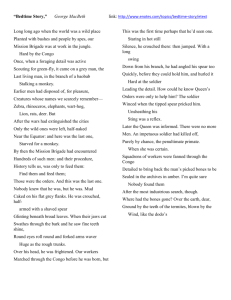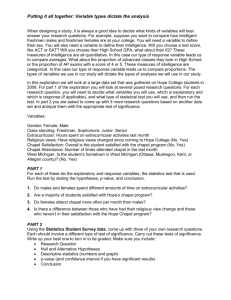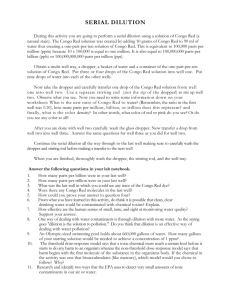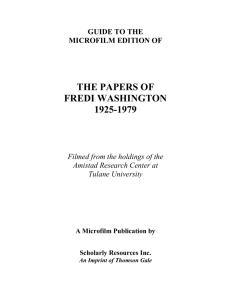Mary Mein Harrison
advertisement
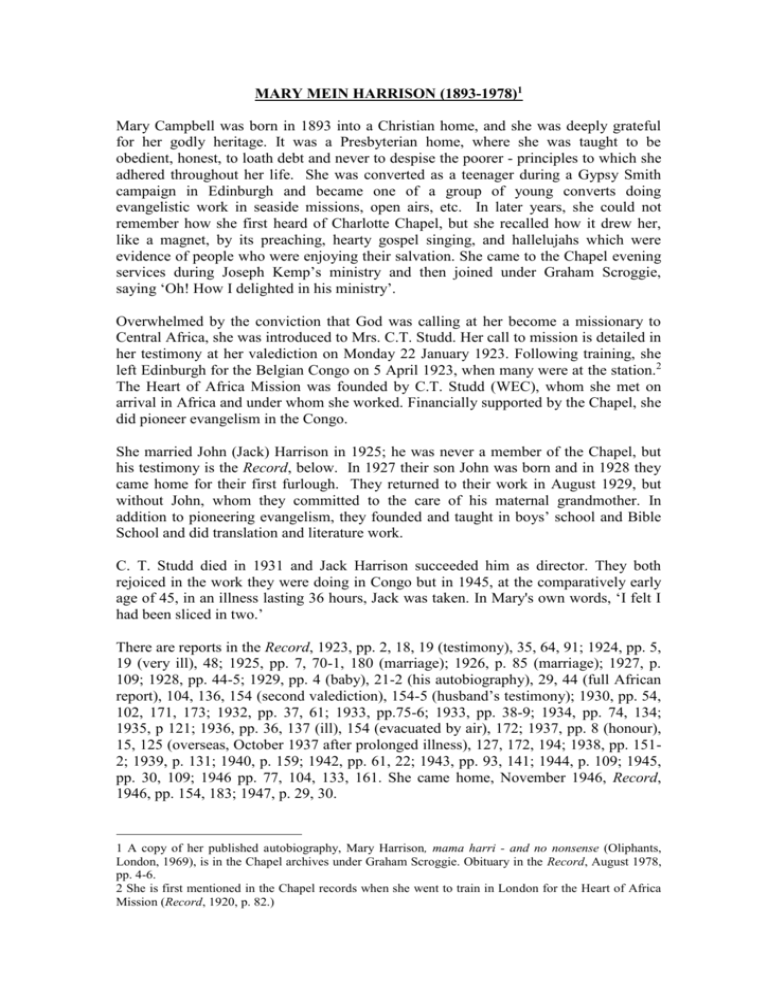
MARY MEIN HARRISON (1893-1978)1 Mary Campbell was born in 1893 into a Christian home, and she was deeply grateful for her godly heritage. It was a Presbyterian home, where she was taught to be obedient, honest, to loath debt and never to despise the poorer - principles to which she adhered throughout her life. She was converted as a teenager during a Gypsy Smith campaign in Edinburgh and became one of a group of young converts doing evangelistic work in seaside missions, open airs, etc. In later years, she could not remember how she first heard of Charlotte Chapel, but she recalled how it drew her, like a magnet, by its preaching, hearty gospel singing, and hallelujahs which were evidence of people who were enjoying their salvation. She came to the Chapel evening services during Joseph Kemp’s ministry and then joined under Graham Scroggie, saying ‘Oh! How I delighted in his ministry’. Overwhelmed by the conviction that God was calling at her become a missionary to Central Africa, she was introduced to Mrs. C.T. Studd. Her call to mission is detailed in her testimony at her valediction on Monday 22 January 1923. Following training, she left Edinburgh for the Belgian Congo on 5 April 1923, when many were at the station.2 The Heart of Africa Mission was founded by C.T. Studd (WEC), whom she met on arrival in Africa and under whom she worked. Financially supported by the Chapel, she did pioneer evangelism in the Congo. She married John (Jack) Harrison in 1925; he was never a member of the Chapel, but his testimony is the Record, below. In 1927 their son John was born and in 1928 they came home for their first furlough. They returned to their work in August 1929, but without John, whom they committed to the care of his maternal grandmother. In addition to pioneering evangelism, they founded and taught in boys’ school and Bible School and did translation and literature work. C. T. Studd died in 1931 and Jack Harrison succeeded him as director. They both rejoiced in the work they were doing in Congo but in 1945, at the comparatively early age of 45, in an illness lasting 36 hours, Jack was taken. In Mary's own words, ‘I felt I had been sliced in two.’ There are reports in the Record, 1923, pp. 2, 18, 19 (testimony), 35, 64, 91; 1924, pp. 5, 19 (very ill), 48; 1925, pp. 7, 70-1, 180 (marriage); 1926, p. 85 (marriage); 1927, p. 109; 1928, pp. 44-5; 1929, pp. 4 (baby), 21-2 (his autobiography), 29, 44 (full African report), 104, 136, 154 (second valediction), 154-5 (husband’s testimony); 1930, pp. 54, 102, 171, 173; 1932, pp. 37, 61; 1933, pp.75-6; 1933, pp. 38-9; 1934, pp. 74, 134; 1935, p 121; 1936, pp. 36, 137 (ill), 154 (evacuated by air), 172; 1937, pp. 8 (honour), 15, 125 (overseas, October 1937 after prolonged illness), 127, 172, 194; 1938, pp. 1512; 1939, p. 131; 1940, p. 159; 1942, pp. 61, 22; 1943, pp. 93, 141; 1944, p. 109; 1945, pp. 30, 109; 1946 pp. 77, 104, 133, 161. She came home, November 1946, Record, 1946, pp. 154, 183; 1947, p. 29, 30. 1 A copy of her published autobiography, Mary Harrison, mama harri - and no nonsense (Oliphants, London, 1969), is in the Chapel archives under Graham Scroggie. Obituary in the Record, August 1978, pp. 4-6. 2 She is first mentioned in the Chapel records when she went to train in London for the Heart of Africa Mission (Record, 1920, p. 82.) 2 In 1946, she returned to Belgian Congo and as new roads opened, she and a lady companion set out to take the gospel to previously unevangelised areas. She was home doing deputation in 1948 (Record, 1948, p. 14). She was in the USA from September 1948 to May 1949 (Record, 1949, pp. 78, 109) and in Edinburgh in June 1949. She returned to Congo in September, 1949, (Record, 1949, pp. 126, 153; 1950, p. 156; 1951, pp. 30, 45; 1952, pp. 46, 47; 1953, pp. 31, 144; 1954, pp. 53, 92; 1955, p. 123; 1956, p. 173; 1957, pp. 14, 44, 76 (review of life), 189. She was home in March 1958, (Record, 1958, pp. 78, 158, 110 (full report), 124; 1959, pp. 59, 92 (return); 1960, pp. 13, 30, 46, 109, 124, 157). After Belgian Congo became independent in 1960, becoming Zaire, she was arrested and imprisoned but shortly released. She was back in 1962, to take up the work (Record, 1961, pp. 109, 158, 174). At the Ter-Jubilee in 1958, she was described in the Conference brochure as: ‘Mrs Mary Harrison pioneered in the Belgian Congo for the first time in 1923 with her husband, who later led the WEC team there. Now she is pioneering a new stretch of territory using the Kipakata road, ‘our road’ as she calls it, built by the Government, along which they are reaching many who never previously heard the Gospel, and into whose language she is translating hymns and Bible stories.’ During the rebellion of 1964, after much mental and physical suffering, she was evacuated, flown to hospital in London, seriously injured, (Record, 1962, pp. 46, 110). She returned in July 1962, (Record, 1962, pp. 157, 190; 1963, pp. 77, 93, 125, 141; 1964, April, p. 21, June, p. 21, August, p. 21; 1965, January, p. 21, May, p. 21, 23, June, p. 23), then home for a while. She resigned in 1965, and there are no more letters in the Record. (Deacons’ Minute, 1 December 1965.) She never intended to retire to her native Scotland, as her life was in Congo, but she gratefully accepted the Chapel’s offer to make her home in Beulah (Record, 1967, February, p, 21; 1968, February; 1969, February, 1970, January), where she spent the last 12 years of the life. While in England on a holiday in 1978, to see WEC friends, she took ill and after a few weeks in hospital died on 5 July 1978. She was survived by her sister, her son John, and his wife and family.
